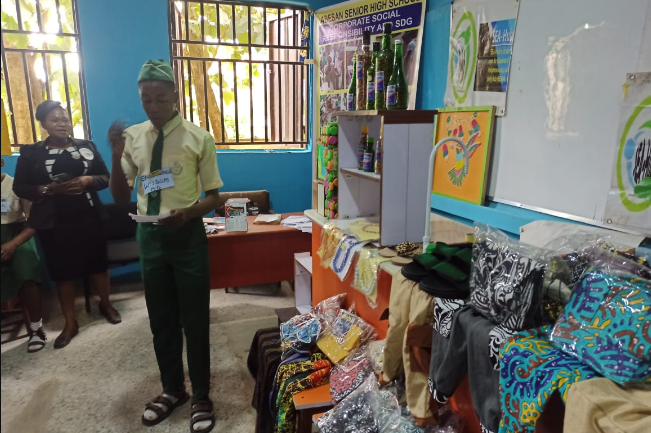Students who are participating in the Students Entrepreneurship Activities-Hub (SEA-Hub) in Lagos have expressed enthusiasm that the programme holds the key to a financially secure future for them.
The student entrepreneurs were speaking during a media tour of some schools involved in the SEA-Hub programme in Lagos on Tuesday.
The tour, conducted by the Deutsche Gesellschaft für Internationale Zusammenarbeit (GIZ) GmbH Nigeria, took journalists to Alimoso Senior Grammar School and Abesan Senior High School, where students’ SEA-Hub activities were inspected.
SEA-Hub is a Pro-Poor Growth and Promotion of Employment in Nigeria Programme (SEDAN) programmes implemented by GIZ to introduce basic entrepreneurship training for secondary schools.
Since the inception, SEA-Hub, over 30,000 school students have been reached in 342 schools across the participating states.
One of such beneficiary is Egberanmi Olusanjo, who was trained under the programme in 2021.
“The project has exposed me to the rudiments of setting up a business. It has also taught me how to provide basic solutions to problems within my community,” Olusanjo said.
Through SEA-Hub, Olusanjo said he was able to start an app, ‘My Idea Africa’, which creates a marketplace and connects artisans to those who require their services.
He also said the programme has helped him to analyse and manage risks better.
Another beneficiary, Olayemi Olamide, was trained in 2019 in “adire” (indigo-dyed cloth) making. She now owns ‘Everything Adire’.
“I started my ‘adire’ business with N500 by collecting people’s old fabrics and reviving them. From there, I’ve been able to plough back profits to the current stage where I sell bespoke ‘adire’ fabrics,” she said.
At Alimosho Senior Grammar School, the SEA-Hub team are using their training to engage in plantain farming, the production of plantain chips and the production of soap and mosquito repellant.
SEA-Hub Managing Director in the school, Akinfenwa Boluwatife, explained what her team of 40 members were engaged in through the programme.
“We use rabbit urine to make mosquito repellant. We source the urine from a nearby school which has a rabbit farm. We also make soap.
“We have also developed a learning app, where students can access academic resources. It also serves more or less as a virtual class, where users can interact with teachers and fellow students,” she said.
Her counterpart at Abesan Senior High School, Kanu Wisdom, said his SEA-Hub team started its entrepreneurship activities with zero capital.
“We just offered menial services to our teachers and other people within the community to raise capital. From there, we moved to make some of the low-capital, low-risk items,” he said.
Wisdom and his team now produce shoes, flower vases, beads, throw pillows and other items from discarded items.
The SEA-HUB is being implemented in three local government areas in Lagos, namely: Alimosho, Agege and Ifako Ijaye.

















Discussion about this post